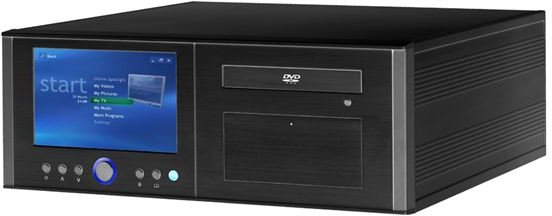What is an HTPC? The Basics You Need to Know
Four Little Letters
HTPC. It is a term that is becoming increasingly popular as the range of PCs it describes blossoms, but like many terms which are growing in popularity it is often run across by folks who don’t know exactly what it describes.
The Roots
At its most basic level a home theater computer is simply a computer which is attached to a home theater. It could be big or small, powerful or weak. However, much as a a pencil would make a poor excuse for an eating utensil, some PCs make poor excuses for HTPCs. There is actually a very specific range of attributes which transform an every day PC into a HTPC.
One is size. All computers are trending towards smaller form factors, but for HTPCs, size is particularly important. Home theaters are computers which sit alongside Blu-Ray players and receivers. Compared to the traditional PC tower these are small devices, and the HTPC cases which are normally considered good HTPC cases are much smaller than the traditional ATX tower.
Another attribute which sets a HTPC apart from most office PCs is the absolute need for a video card. Displaying high resolution video is an intensive task which not every computer can easily complete. A good HTPC will need to have a modern video card which is small, quiet, and powerful.
The final and perhaps most important attribute is the control scheme. Normal PCs are controlled by a keyboard and mouse, but such devices are obviously too awkward for use on a couch. HTPCs are instead mostly controlled with remotes similar to those found with a television, although the best HTPC remotes are usually more advanced products like the Logitech Harmony series of Windows-compatible remotes.
PC Manufacturer Products
The three attributes listed above are what set a HTPC apart from a normal PC, but the HTPC experience can be further tailored towards the home theater and away from traditional PC uses. This is where PC manufacturers step in. The top HTPC manufacturers have some very unique products available.
Take Velocity Micro, for example. Their line of high-end CineMagix FuseBox HTPCs is designed to be the heart of home media throughout an entire home. It supports playing videos in up to two areas of a home and playing music in up to five. It also includes a custom interface designed to make it much easier to navigate through media files with a remote.
Other providers, such as Okoro, make custom HTPC systems which act as both a computer and a home theater receiver in one. Products of this type truly transcend the function of a normal PC into something entirely different and focused exclusively on entertainment.
Putting it Together
HTPCs both are and aren’t a class of their own. Technically speaking any HTPC is also theoretically capable of being an extremely competent home computer. Indeed, those who generally use their PC both as a PC and as their home theater could do well by building a HTPC and using it for day-to-day tasks as well.
However, HTPCs are also clearly a breed of their own, built to accomplish tasks that a normal computer cannot. Perhaps someday in the future, when all PCs are the size of a matchbox and capable of displaying flawless video without generating a hint of heat, the distinction will no longer matter. For now, however, the term HTPC means something special.
